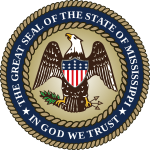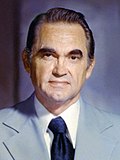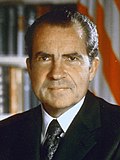| |||||||||||||||||||||||||||||||||||||
| |||||||||||||||||||||||||||||||||||||
| |||||||||||||||||||||||||||||||||||||
| |||||||||||||||||||||||||||||||||||||
| Elections in Mississippi |
|---|
 |
The 1968 United States presidential election in Mississippi was held on November 5, 1968. Mississippi voters chose seven electors, or representatives to the Electoral College, who voted for President and Vice-President. During the 1960s, the Civil Rights Movement dictated Mississippi's politics, with effectively the entire white population vehemently opposed to federal policies of racial desegregation and black voting rights.[2][3] In 1960, the state had been narrowly captured by a slate of unpledged Democratic electors,[c] but in 1964 universal white opposition to the Civil Rights Act and negligible black voter registration[d] meant that white Mississippians turned almost unanimously to Republican Barry Goldwater (apart from a small number in the northeast of the state opposed to Goldwater's strong fiscal conservatism).[4] Goldwater's support for "constitutional government and local self-rule"[5] meant that the absence from the ballot of "states' rights" parties or unpledged electors was unimportant. The Arizona Senator was one of only six Republicans to vote against the Civil Rights Act,[6] and so the small electorate of Mississippi supported him almost unanimously.
Following the passage of the Voting Rights Act of 1965, federal examiners registered Mississippi blacks as voters in large numbers: African American registration rose from under seven percent to over fifty-nine percent between mid-1965 and 1968.[7] Extreme anger ensued among white Mississippians, because black voting in significant numbers would threaten the entire social fabric of the Black Belt[8] and was even feared by the few upcountry whites who had stayed loyal to Johnson.[9] The anger of Mississippi's whites was seen in the 1967 Democratic gubernatorial primary, when both Black Belt whites and their traditional foes in the upcountry supported conservative John Bell Williams against William Winter, whom it was believed was favored by the newly registered black voters, although no politician in the state would yet openly court black support.[10]
In addition, the Twenty-Fourth Amendment and resultant abolition of Mississippi's poll tax had allowed large increases in both white and black voter registration,[11] with some of these drives run by white supremacist groups such as the Ku Klux Klan. Consequently, when segregationist former and future Alabama Governor George Wallace announced in early 1968 that he would mount a third-party candidacy for the Presidency, he had a powerful base in the Deep South. Meanwhile, the Republican Party, under new RNC Chairman Ray C. Bliss, had of necessity moved away from the strident conservatism of Goldwater.[12]
Given Wallace's reputation on racial issues, it was inevitable that he would be endorsed by Mississippi's established Democratic Party leadership, and this happened in September.[13] William Winter, the losing candidate for Governor the previous year, did support Democratic nominee Hubert Humphrey, but knew that it would be too risky to actively campaign for him.[14] By August, it was widely accepted that Wallace would carry Mississippi by a large margin,[15] as apart from a small number of wealthy urban communities he had captured a virtual monopoly of the state's white electorate. Wallace was the only candidate to campaign in the state;[13] Humphrey won more than twenty percent of the vote in just five of the state's 82 counties. Nixon only received 13% of the vote, making Mississippi his worst state in the election.[16] 83% of white voters supported Wallace, 17% supported Nixon, and 0% supported Humphrey.[17][18][19]
- ^ "General Election November 5, 1968," Mississippi Official and Statistical Register 1968-1972 (Jackson, 1969)
- ^ Crespino, Joseph; In Search of Another Country: Mississippi and the Conservative Counterrevolution, p. 206 ISBN 0691122091
- ^ Mitchell, Dennis J.; A New History of Mississippi; p. 453 ISBN 1617039764
- ^ Phillips, Kevin P.; The Emerging Republican Majority, pp. 208, 210 ISBN 9780691163246
- ^ Katagiri, Yasuhiro; The Mississippi State Sovereignty Commission: Civil Rights and States' Rights, p. 203 ISBN 1604730080
- ^ Thernstrom, Stephan and Thernstrom, Abigail; America in Black and White: One Nation, Indivisible, p. 151 ISBN 1439129096
- ^ Mickey, Robert; Paths Out of Dixie: The Democratization of Authoritarian Enclaves in America's Deep South, 1944-1972, pp. 289-290 ISBN 1400838789
- ^ Phillips; The Emerging Republican Majority, p. 253
- ^ Phillips; The Emerging Republican Majority, p. 264
- ^ Dittmer, John; Local People: The Struggle for Civil Rights in Mississippi, p. 417 ISBN 0252065077
- ^ Mickey, Paths out of Dixie, p. 290
- ^ Polsky, Andrew J.; The Eisenhower Presidency: Lessons for the Twenty-First Century, p. 34 ISBN 1498522211
- ^ a b Nash, Jere and Taggart, Andy; Mississippi Politics: The Struggle for Power, 1976-2008, p. 29 ISBN 1604733578
- ^ Bolton, Charles C.; William F. Winter and the New Mississippi: A Biography, p. 150 ISBN 1617037877
- ^ Crespino, In Search of Another Country, p. 221
- ^ 1968 Presidential General Election Results – Mississippi US Election Atlas
- ^ Black & Black 1992, p. 147.
- ^ Black & Black 1992, p. 295.
- ^ Black & Black 1992, p. 335.
Cite error: There are <ref group=lower-alpha> tags or {{efn}} templates on this page, but the references will not show without a {{reflist|group=lower-alpha}} template or {{notelist}} template (see the help page).
© MMXXIII Rich X Search. We shall prevail. All rights reserved. Rich X Search





